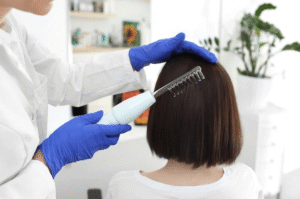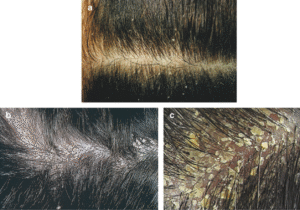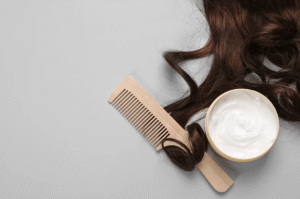
Dandruff and Hormonal Imbalances: What’s the Link?

Dandruff and Hormonal Imbalances: What’s the Link?
At Midas Wellness Hub, we believe every symptom your body shows is part of a larger story. When it comes to dandruff, it’s easy to blame it on weather changes or harsh shampoos, but did you know your hormones could also be playing a role?
Let’s dive into how hormonal imbalances can trigger or worsen dandruff and how you can take a holistic approach to bring your scalp back to balance.
Understanding Dandruff: More Than Just Dry Flakes
Dandruff is a chronic scalp condition marked by:
- White or yellow flakes
- Itchiness or tightness
- Oily or irritated scalp
It’s often caused by Malassezia, a yeast-like fungus that lives on the scalp. But why does it grow uncontrollably in some people?
That’s where hormones come into play.
Hormones and the Scalp: What’s the Connection?
Your scalp, just like your skin, is hormonally responsive. Hormones regulate:
- Sebum production (your scalp’s natural oil)
- Inflammatory response to irritants or fungus
- Cell turnover rate, which affects how often dead skin is shed
- When your hormonal balance is disrupted, these functions go off track, creating a perfect environment for dandruff.
Key Hormones That Influence Dandruff
1. Androgens (Testosterone, DHT)
These hormones increase sebum production.
Excess oil makes the scalp sticky, trapping dead skin cells. This builds a breeding ground for Malassezia, leading to seborrheic dermatitis, a severe form of dandruff.
Common in: Teenagers, individuals with PCOS, and men with high testosterone levels.
2. Cortisol (Stress Hormone)
High stress levels lead to increased cortisol, which disrupts immune function.
This weakens your skin’s natural barrier and invites fungal overgrowth.
Stress also triggers inflammation, making dandruff worse.
You may notice: Dandruff flares during exams, deadlines, or emotional periods.
3. Thyroid Hormones (T3, T4)
An underactive thyroid can lead to dry, flaky skin, including the scalp.
Reduced sebum means less protection for the scalp’s microbiome.
Common signs: Dry hair, fatigue, brittle nails, along with dandruff.
4. Estrogen and Progesterone
These regulate oil balance in women.
When estrogen drops (such as during menstruation, postpartum, or perimenopause), oil production can change drastically.
This hormonal dip may disrupt the scalp’s pH and trigger flakiness or sensitivity.
Real-Life Scenarios: Hormonal Dandruff Triggers
Case 1: PCOS & Persistent Dandruff
A woman in her 20s visits Midas Wellness Hub with recurring dandruff despite using medicated shampoos. Further consultation reveals PCOS a condition that elevates androgens. After customized scalp therapy paired with hormone-balancing lifestyle changes, her symptoms dramatically reduce.
Case 2: Teenage Dandruff Surge
A 16-year-old boy experiences an oily scalp and flaking around his hairline. His androgens are naturally rising due to puberty. A non-invasive treatment plan at Midas, focused on oil control and inflammation restores scalp balance.
How We Treat Hormonal Dandruff at Midas Wellness Hub
We understand that dandruff caused by hormonal issues is not just a surface concern. That’s why our approach is always holistic and tailored.
Expert Scalp Diagnosis
We analyze oil production, flake density, inflammation, and underlying conditions using advanced techniques.
Customized Scalp Detox & Wash
We use pH-balanced, anti-fungal scalp cleansers enriched with natural actives like tea tree, rosemary, and zinc pyrithione to:
- Control oil
- Cleanse pores
- Restore microbial balance
- High-Frequency Infrared & UV Light Therapy

This painless, advanced therapy helps:
- Kill dandruff-causing fungi
- Reduce inflammation
- Stimulate blood flow for hormonal rebalancing
- Growth Factor
If your hormonal imbalance is linked to hair fall and thinning, we may include:
- PRP (Platelet-Rich Plasma)
- GFC (Growth Factor Concentrate)
These work to revive dormant follicles and rebalance scalp health from within.
Lifestyle Coaching
We go beyond treatment with:
- Diet suggestions to stabilize hormones (think zinc, omega-3, B6)
- Stress management techniques (meditation, herbal teas)
Gentle haircare routines that avoid stripping the scalp
Tips for Managing Hormonal Dandruff at Home
1. Eat hormone-friendly foods
Include flaxseeds, pumpkin seeds, leafy greens, and fermented foods.
2. Sleep & stress management
Practice regular sleep hygiene and explore calming rituals.
3. Don’t overwash
Washing hair too often can strip natural oils, worsening dry dandruff.
4. Choose the right shampoo
Look for sulfate-free, antifungal shampoos with salicylic acid or ketoconazole.
5. Track your cycle (for women)
Notice when flaking increases, pre-menstrual days may require more scalp TLC.
When to See a Specialist
You should seek help if:
- Over-the-counter solutions don’t work
- Dandruff returns right after washing
- Your scalp feels oily yet flaky
You experience hair thinning or hair fall along with flaking
You suspect hormonal conditions like PCOS, thyroid disorders, or stress-related imbalance
The Midas Promise
At Midas Wellness Hub, we understand that the root cause of skin and hair issues often lies beneath the surface. Our advanced dandruff therapies are backed by:
- Modern technology
- Nature-powered ingredients
- Scientific insight into hormonal links
- A calm, healing environment in Borivali West
Because for us, it’s not just about a clean scalp, it’s about empowering you to feel balanced from the inside out.
Book Your Hair Consultation
Take the first step toward scalp harmony.


